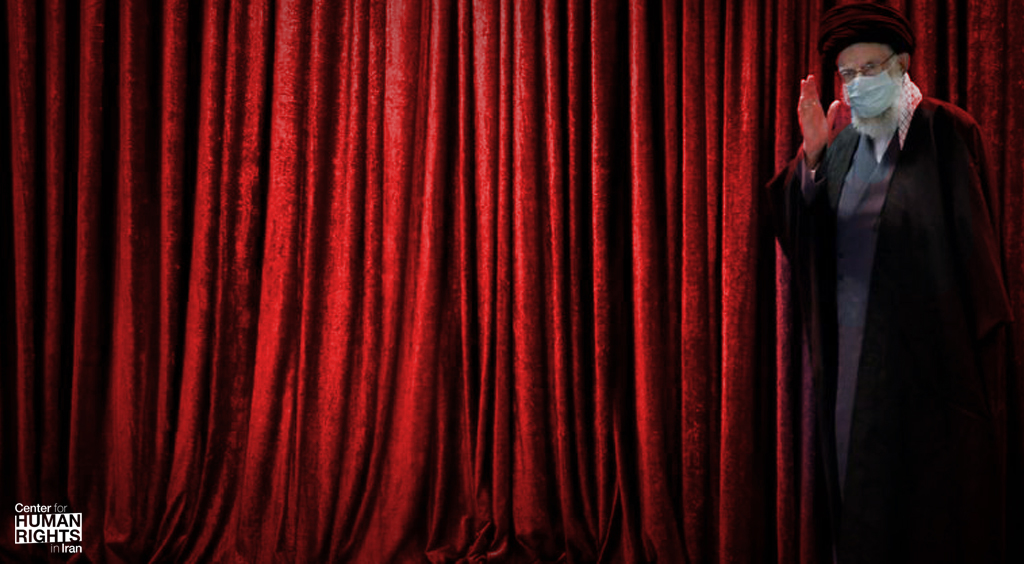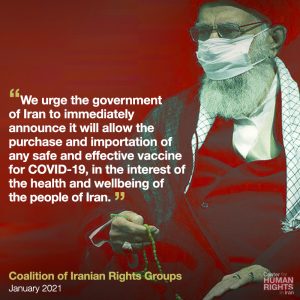Iran Touts Unverified Domestic Vaccines, Ignores International Condemnation of Non-Scientific Policy
 When the World Health Organization approved vaccines to fight the COVID-19 pandemic, many countries began planning for mass immunizations.
When the World Health Organization approved vaccines to fight the COVID-19 pandemic, many countries began planning for mass immunizations.
Yet the Iranian supreme leader’s televised speech on January 8–where he announced that “importing American and English vaccines into the country is forbidden”–dimmed hopes for an effective and rapid effort to protect Iranians from the deadly virus.
Iran has reported the highest number of deaths from the coronavirus outbreak in the Middle East–at 57,150 officially registered deaths as of January 22, 2021, according to domestic data. However, many experts believe the actual number of deaths has been undercounted.
In the immediate aftermath of Ayatollah Ali Khamenei’s remarks, Iran’s Red Crescent Society announced it would no longer accept 150,000 vaccine doses made by the American Pfizer pharmaceutical company, which had been purchased by Iranian philanthropists.
Iranian officials also stated that domestically developed vaccines would be available soon despite conclusive data on the vaccines’ safety and effectiveness on the 21 volunteers who have so far participated in initial clinical trials.
Two days after Khamenei’s ban, three senior members of the Iranian Medical Council including its president, Dr. Mohammadreza Zafarghandi, as well as Dr. Iradj Fazel, the head of the Iranian Medical Society, wrote to President Hassan Rouhani pleading for a depoliticized approach to the purchase of vaccines.
“Prioritizing the purchase of vaccines is of critical and vital importance and must be done purely on the basis of science and the national interest, free from politics,” said the letter dated January 10.
“Although our colleagues and scientists inside the country are making a very worthy effort to produce a domestic vaccine… it will not bear results any time soon,” added the letter.
On January 15, more than 500 Iranian activists and personalities–most of them based abroad–published a joint open letter condemning the ban on western vaccines as a “crime against humanity.”
“Khamenei’s ban on vaccines made in the U.S. and UK has endangered the lives of thousands of Iranians while he, his associates and senior officials of the Islamic Republic receive treatment with the most sophisticated western equipment and pharmaceuticals and fly abroad to countries such as the UK whenever they require further medical attention,” said their letter.
Ten international human rights organizations also called on the Islamic Republic to rescind the ban and allow Iranians to purchase any and all safe and effective vaccines.
 “After nearly a year, a swift and equitable vaccination campaign remains the best option to save lives, prevent illness, and slow the spread of the virus,” said the joint statement dated January 20. “While some Iranian authorities insist on waiting for Iran to finish developing its own vaccines, and Iranian vaccines can eventually help fight the pandemic, there is no scientifically justifiable reason to wait or limit supply. Delaying the vaccination process will only prolong the deadly health crisis.”
“After nearly a year, a swift and equitable vaccination campaign remains the best option to save lives, prevent illness, and slow the spread of the virus,” said the joint statement dated January 20. “While some Iranian authorities insist on waiting for Iran to finish developing its own vaccines, and Iranian vaccines can eventually help fight the pandemic, there is no scientifically justifiable reason to wait or limit supply. Delaying the vaccination process will only prolong the deadly health crisis.”
“We urge the government of Iran to immediately announce it will allow the purchase and importation of any safe and effective vaccine for COVID-19, in the interest of the health and wellbeing of the people of Iran,” added the statement.
Several organizations inside Iran also objected to the supreme leader’s decree, including the Free Workers Union of Iran, the National Union of Retirees, teachers unions, and the Tehran Bus Company Workers Union.
In their January 17 statement, the country’s National Union of Retirees suggested that the ban on importing western vaccines is aimed at boosting profits of the Barakat Foundation, an Iranian pharmaceutical holding company owned by the Headquarters for Executing the Order of the Imam Khomeini, known as Setad–which is under the supreme leader’s control.
“Refusing to purchase vaccines from countries such as the U.S., UK and France is directly tied to profits in the health sector,” the statement said.
It continued: “Commercializing public health and profiteering during a crisis is the ruling establishment’s strategy to compete with the world’s vaccine producers and ban their products in order to generate more revenues for domestic pharmaceutical giants such as Setad’s Barakat Foundation.”
In the January 19 meeting of the headquarters for the national campaign against COVID-19, President Rouhani announced that the first shipment of vaccines approved by Iran’s Health Ministry would be imported and administered “in the coming weeks.”
He did not indicate where the vaccines were purchased.
However, according to Mansour Kabganian, the deputy director of the Comprehensive National Scientific Road Map, the government is planning to import 16.8 million COVID-19 vaccine doses through the World Health Organization’s Covax process as well as an additional 25.5 million doses “from a company whose product is not based on the Pfizer platform.”
He added that nine Iranian private and public-sector companies are working on producing four different types of the vaccine, which are expected to be ready by late spring 2021, “but what concerns us is whether we can mass produce one or two million doses or more.”
The company that has received most attention in the domestic search for a vaccine is Shafa Pharmed Pars, a subsidiary of Setad’s Barakat Foundation, which began human trial inoculations with much fanfare in front of TV cameras on December 29, 2020.
The first to receive the vaccine was Tayyebeh Mokhber, the daughter of Setad’s CEO Mohammad Mokhber.
“Inoculating Dr. Mokhber’s daughter was a message to the Iranian nation that we are planning to inject them with something that we believe in and approve,” said Health Minister Saeed Namaki.
On January 19, Setad CEO Mokhber claimed that Shafa Pharmed Pars “has created the capacity to produce two to three million vaccine doses within the next month.”
“In the next three or four months, production will reach 13 to 14 million doses per month and the country… will become self-sufficient,” he said.
On January 21, Minoo Mohraz, a member of the anti-COVID campaign headquarters, said 21 people had received the Iranian vaccine so far and added, “In the following days, 56 more volunteers will be vaccinated and after that 300 to 500 others will receive the vaccine and if the results are successful, general vaccinations will begin.”






